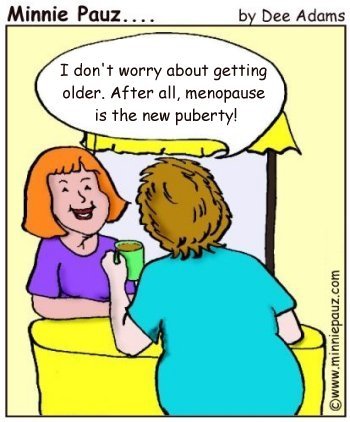
If you’re in your 40's or 50's and you have kids in the house, you’re probably familiar with what I like to call “dueling hormones.” I’ve also seen this referred to as a “hormone house” or, my favorite, “mother nature’s practical joke.”
This is that ever-so-special time when Mom is going through perimenopause and menopause and her kids are going through puberty, all under the same roof. Who just had a meltdown and locked themselves in their bedroom? Was it daughter, son or Mom? With all these hormonal fluctuations happening at once, things can get more than a little hectic!
Fortunately, amidst the chaos (which will often peak during the holidays or other high-stress times like the start of a new school year), there is a real opportunity to take these challenges and turn them into a time of growth and connection. Often, the anger or outbreaks that come with hormonal fluctuations are really just an overflow or projection of the same anger and frustration that we might harbor against ourselves. Working on yourself and your own personal growth, knowing your body and being prepared for perimenopause and menopause will help ease the super-tense dynamics that can develop with the people closest to you.
One of the most difficult aspects of puberty for a parent to deal with is the oh-so-common communication shutdown. Many kids just stop talking to their parents. They don't want to hear anything from you or share anything with you! Your teenager is trying to find his or her own independence and confidence, so this kind of pushback is common and normal at this age. However, when you're going through perimenopause and menopause and you're already feeling emotionally shaky yourself, it can be hard not to take this radio silence personally.
In a recent interview with the Star-Tribune, psychologist Bruce Fischer spoke of how to deal with the opposite side of silence and outbursts. "For everyone in the family, the first step is learning to recognize when you're being emotionally over the top... The moms are just worn out, and you have this collision of issues. When [your children] are in those intense emotional states, either leave them alone or just listen until they de-escalate. Ignore the content, which can often be illogical. Focus on what they're feeling and remember that kids at this age sometimes need to win a conflict, or at least tie." (To read the full article, see the resource section below.)
When communication shuts down completely, everyone suffers, so it is important to keep talking. Let them know that you love them, you care about them and you are here for them if they need you, all the while respecting their journey towards independence. The best way to begin this process is to remind yourself that it isn't about you. Try not to personalize their silence and outbreaks. Remind yourself that just as you are going through your own hormonal roller coaster and life-changing experiences, so are your kids. The difference is this is their first time at the hormone thrill park. Your kids may not have a perspective on what's happening, but you have a life-so-far wealth of experience to share with them.
You're the parent, so you can be the first to give. Share your own challenges openly, so they know what you're going through. This gives them an opportunity to relate to you, even if they don't want to show it. In Shmirshky: The Pursuit of Hormone Happiness, there's a Shmirshky Daily Symptoms Chart on pages 168-69 to help women identify and track menopause symptoms. Many women have found that going through the chart with their teens can help open up the conversation about what they're both experiencing. Chances are, you and your teen can relate about sleepless nights and mood swings.
You may feel like an alien has swooped down and taken over your dear, sweet child, but remember, they may be looking at you with the same thoughts! Of course, every household is different, and it may take some tweaking to customize this loving approach to fit your own unique family structure. The more we educate and empower our self and our loved ones, the happier and more compassionate the whole house will be. Ignore those rolling eyes -- make eye contact and talk it out!
Remember: Reaching out is IN. Suffering in silence is OUT!
Tell me: Have you experienced life in a hormone house? What strategies work(ed) for you in restoring your family’s hormone happiness?
Additional resources:
- "Warning: Extra hormones in the house," by Kristin Tillotson, Star Tribune
- Menopause and Puberty: A Deadly Combination, by Vanessa Van Petten, radicalparenting.com
- Great resources to share with your kids:
- Boys and Puberty, kidshealth.org
- Talking to your daughter about puberty, kidshealth.org
- Girls and Puberty, eschooltoday.com
- Boyz Zone, What is puberty for boys?, eschooltoday.com
About Ellen Dolgen
Ellen Sarver Dolgen is the author of Shmirshky: the pursuit of hormone happiness--a cut-to-the-chase book on perimenopause and menopause that's filled with crucial information, helpful guides, and hilarious and heartfelt stories. Known for her humor, compassion, and sassy personality, E has appeared on numerous television and radio broadcasts, including: the Rachael Ray Show, The Doctors, Oprah Radio, Playboy Radio, “Tell Me More” on NPR, Doctor Radio, and dozens of other regional and national media outlets. She appears monthly as a menopause and women's wellness guest on KSWB Fox 5 Morning News San Diego and is a regular guest on the popular radio show, “Broadminded,” on Sirius XM Radio (Stars XM 107). E is also one of the first regular contributors to debut on the Huffington Post’s latest site, Huff/Post50. When E isn’t promoting women’s health and wellness, she’s busy trying her best not to eat all the ice cream in the freezer.
For more from Ellen, visit EllenDolgen.com.
Like Shmirshky on Facebook: http://www.facebook.com/Shmirshky
Find Ellen on Linkedin: www.linkedin.com/pub/ellen-dolgen/39/824/17b
